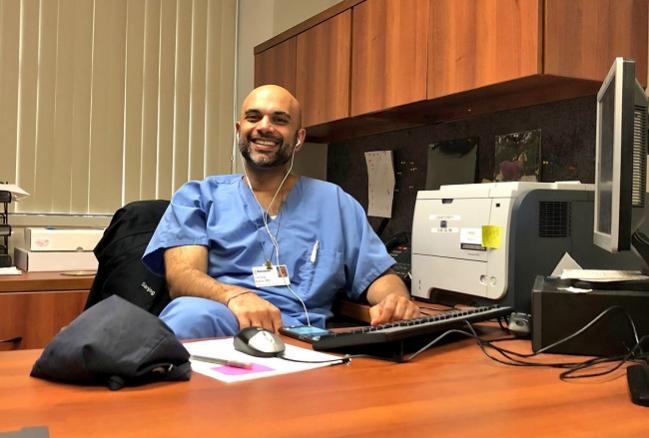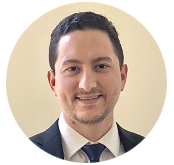Early CHIP-Trained Fellow in the United States Offers Insights: Sanjog Kalra, MD
One fellow gets into the nitty gritty of learning to perform complex, higher-risk indicated procedures and the challenges of starting a career in this field.

Over the past decade, the field of interventional cardiology has grown tremendously. In addition to simple coronary revascularization, today’s interventional cardiologists can treat a vast array of cardiovascular issues, including structural heart disease, peripheral vascular disease, and complex coronary disease, in patients who were previously considered unapproachable for percutaneous therapy. Early in my general cardiology training, I started to hear the words "CHIP operator"—referring specifically to those trained to treat complex, higher-risk indicated patients—thrown around by colleagues and mentors in the catheterization lab and I was curious to learn more. I searched for programs that offered that curriculum and learned that only a few institutions around the country offered CHIP training. Moreover, only a handful of interventionalists had gone through it.
Sanjog Kalra, MD (Einstein Medical Center, Philadelphia, PA), is one of them. Kalra was the first graduate of Columbia University Irving Medical Center’s formalized CHIP fellowship in New York, NY, in 2016. He did his interventional cardiology fellowship at St. Michael’s Hospital/University of Toronto, Canada, where he also did his internal medicine residency, before completing his adult cardiology fellowship at Dalhousie University in Halifax, Canada. He also has a master’s degree in clinical pharmacology, and his interests include advanced cardiovascular hemodynamics, complex coronary interventions, coronary chronic total occlusions (CTOs), mechanical circulatory support, and cardiac critical care. Kalra is currently the director of complex coronary therapeutics and the associate program director of the interventional cardiology fellowship at his institution. I sat down with him to discuss CHIP and glean some insight burgeoning field.
Luai Tabaza (LT): What is a CHIP fellowship?
Sanjog Kalra (SK): Early pioneers in this field, including Columbia University’s Martin Leon, Jeffrey Moses, Ajay Kirtane, and Dimitri Karmpaliotis, among others, recognized a “risk-treatment paradox,” thus an unmet need for complex and high-risk patients—those who are the most ill and who harbor the most complex coronary disease have the most to gain from our therapies and are simultaneously the least likely to be treated. CHIP fellowships focus on training operators to address this unmet need by offering optimal and where possible, complete revascularization to the complex, high-risk indicated patient (CHIP) subset. These are patients with multiple comorbidities, poor ventricular function, or grossly deranged hemodynamics, as well as those with anatomically complex, atypical, or high-risk coronary disease (ie, CTOs, single remaining coronary vessel, severe calcification, multivessel disease and proximal bifurcations). In essence, the aim of the CHIP fellowship is to create operators who are comfortable dealing with both the medical and interventional complexities of delivering care to this patient population.
LT: CTO PCI continues to be the subject of debate, with a limited number of trials producing mixed results. What do you say to those who argue that the data behind CTO PCI are not strong?
SK: There is considerable controversy around the data in support of CTO PCI, in part because many in the interventional community are accustomed to our therapies bringing benefits in hard outcomes such as mortality. Ultimately, however, when the data behind CTO PCI are carefully examined, the benefits of successful CTO revascularization are quite clear: improvement in symptoms and quality of life, a reduction in life-threatening arrhythmias, and in some cases an improvement in ventricular function. Interestingly, these are much the same as the benefits of typical non-CTO PCI in stable ischemic disease, the provision of which remains controversial to some as well. Ultimately, the success of CTO PCI comes down to careful patient selection, like any other therapy. Patients with a large ischemic burden or who have symptoms that are refractory to conservative therapies are likely to benefit from successful CTO revascularization with a low rate of complications in the hands of an experienced and properly trained operator.
LT: Some in the field also question the immense risk behind certain CHIP procedures as well as the potential financial incentives to perform them. What would you say to them?
Regarding the risk of CHIP procedures, my thoughts are simple: let the patient guide you. Just because a lesion is harder to treat or a patient is sicker, it does not mean that the indication to treat the lesion or care for the patient is different. So, if our patients need treatment, it is our responsibility as providers to provide it, as long as our patients understand the risks and benefits of proceeding with the treatment plan. Further, if a procedure is considered high risk or too risky for a given operator, that individual must be honest with the patient and refer the case to an operator who is able to provide the treatment that is necessary, recognizing that with increasing complex and high-risk case volume, success rates rise and complication rates decline. This has been shown very nicely in the CTO literature.
As far as the finances around CHIP procedures, we can think about CTO PCI as a prototypical example. The literature shows that the cost contribution for CTO PCI, despite its complexity and need for more equipment compared to traditional non-CTO PCI, is in fact positive not negative (as shown in multiple data subsets) because the reimbursement for these procedures is also higher. The same can be said for CHIP procedures that require the use of percutaneous mechanical circulatory support, which map (for inpatients) to a very profitable diagnosis-related group (DRG). Additionally, recognized CHIP programs that confer an aura of elevated competence and achievement can help foster additional referrals to other related programs—the so-called "halo effect." Ultimately, the financial viability of any CHIP program rests in providing appropriate, optimized procedural care with high success rates and low complications and comprehensive periprocedural support, yet another reason for dedicated CHIP operators and developed CHIP programs.
LT: Interventional cardiology fellows today spend at least 7 years in training between their internal medicine residency, general cardiology fellowship, and an interventional year. Most by that time are eager to start practicing independently. So, why should they do an additional CHIP fellowship year?
SK: One of my mentors, Dr. Karmpaliotis, once told me I was chosen as the CHIP fellow at Columbia because I “wanted it more than everybody else.” As a prospective CHIP trainee, you have to ask yourself a few simple questions: Do I love taking care of really sick patients? Do I enjoy constant challenge in the cath lab? Do I like to push the envelope in coronary intervention by trying new technologies and techniques? Am I willing to persist to achieve optimal results? For those who answer yes to these questions, a CHIP fellowship is ideal preparation.
LT: What qualities should a potential CHIP fellow possess?
SK: In my role as an associate program director now, what I look for in potential candidates for our interventional program are the same things that I would seek in any potential CHIP fellowship candidate—strong clinical knowledge; belief in the benefits of complete revascularization; commitment to technical and academic growth in coronary intervention and hemodynamic support; tremendous humility; the ability to deal with adversity, challenge, and failure; a willingness to work collaboratively as part of a highly skilled team; and above all a total commitment to optimal patient care.
LT: Why should hospitals and academic centers look to recruit CHIP operators?
SK: CHIP operators represent the future of coronary intervention. The data are quite clear. The number of patients with advanced age, calcific or more complex anatomic disease, and poor ventricular function is on the rise. To treat these patients, experience matters! The more experienced the operator, the better the outcome. This was demonstrated quite well in studies from the PROGRESS CTO registry several years ago. Healthcare organizations that appreciate this trend are hiring CHIP operators to ensure that the right expertise exists within their interventional teams to manage this growing subset of patients.
Another reason for hospitals, and in particular academic centers, to hire these types of operators is, as our internal data show, that within the first year of adding a complex PCI operator, overall cath lab volume grows by approximately 10%. Further, research in the CHIP space—including the confluence of physiology and intravascular imaging, hemodynamic support devices, and advanced coronary technologies and techniques to achieve complete revascularization—is expanding, with tremendous investment placed in those participating in it.
LT: These procedures, in addition to advanced skills, require time, equipment, and highly trained staff. What does it take to start a CHIP program? And what are some of the “dos and don’ts” when it comes to starting one?
SK: Well, that’s a loaded question and an hour-long talk on its own! In brief, to start a CHIP program, it takes partnership from all major stakeholders. That includes the interventional cardiologists, referring noninvasive cardiologists and critical care physicians, cardiac surgeons, and of course the hospital administration, who must be oriented to the data in support of these types of procedures, the important clinical benefit that they deliver to our patients, and the potential financial and academic benefit that a CHIP program can bring to an institution—not the least of which is a highly developed partnership amongst its heart and vascular team members. Additionally, the inception and growth of a CHIP program requires a clear investment from the institution, both in community education and procedural infrastructure, including equipment, staff, and cath lab time, that is required to generate referrals and provide optimal care to these patients.
Perhaps the most important “do” of starting a CHIP program is careful case selection. Rome was not built in a day; your CHIP program won’t be either. Early on, pick cases with a high likelihood of success, and make sure that your CHIP team is fully on board. Then, as your volume and track record develop, take on more challenging cases.
An important “don’t” of a new CHIP program is going at it alone. One of the most important lessons that I learned as a CHIP fellow is that a case is not done until the patient is safe and stable at home after discharge. It takes a village to see CHIP procedures through to success, and so a solid team with varied expertise all working together to achieve success is critical.
LT: Any advice to interventional fellows in training?
SK: Make sure, above all, that you love what you do. Our patients need fully committed physicians, and those who love what they do and see it as a calling are best positioned to provide optimal care. From a practical perspective, make your interests known early and find a mentor who can help you plan your training and advocate for you when you need help. Lastly, put yourself out there. By meeting as many people in your area of interest as possible, you’re creating opportunity. You never know when one, or several of them, might become your mentors.
LT: Between your hours in the cath lab, how do you like to spend your free time?
SK: For me, it is my family. As a husband and a proud father of two, I try to spend as much time as I can with them. I really enjoy traveling and take every opportunity I can do so. While in town, I like to play golf, ice hockey, and soccer.
*Note: The Cardiovascular Research Foundation, which owns and operates TCTMD, offers courses in CHIP training, for which it receives industry support. The topic of this blog was chosen by the blogger.
2018-2019 Fellow Talk Blogger
Luai is currently an interventional cardiology fellow at Albert Einstein Medical Center (Philadelphia, PA). After finishing…
Read Full Bio

Comments